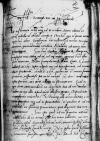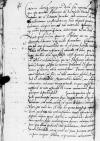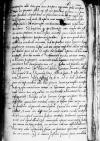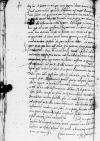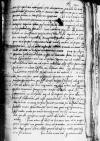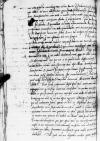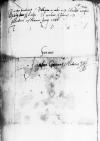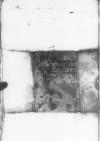Etsi statueram nihil umquam ad te scribere, tamen idoneum ac certum tabellarium oblatum, nempe dominum Stanisław Lasota (*ca. 1515 – †1561), from 1543 courtier of Queen Elisabeth of Austria, wife of King Sigismund II Augustus of Poland, after her death in 1545, courtier, diplomat and royal secretary of Sigismund II August of Poland (PSB 16, p. 555)⌊StenelaumStanisław Lasota (*ca. 1515 – †1561), from 1543 courtier of Queen Elisabeth of Austria, wife of King Sigismund II Augustus of Poland, after her death in 1545, courtier, diplomat and royal secretary of Sigismund II August of Poland (PSB 16, p. 555)⌋, non sum passus vacuum meis litteris abire, existimans has saltem ad manus tuas perventuras, quemadmodum mendacia et calumniae ad aures tuas pervenerunt. Ex litteris domini Alfonso d' Aragona cousin of Queen Bona Sforza d'Aragona, godfather of Diego Gracián de Alderete; secretary and member of the council of Ferdinand I; 1544 envoy of Emperor Charles V of Habsburg to Poland and Lithuania, with the task of improving the martial relations of Sigismund II Augustus and Elisabeth of Habsburg, and persuading the Polish king to take part in an anti-Turkish crusade (CEID 2/1, p. 191; DEGGELLER, p. 38; WIJACZKA 1998, p. 167-170, 276-277)⌊Alphonsi de AragoniaAlfonso d' Aragona cousin of Queen Bona Sforza d'Aragona, godfather of Diego Gracián de Alderete; secretary and member of the council of Ferdinand I; 1544 envoy of Emperor Charles V of Habsburg to Poland and Lithuania, with the task of improving the martial relations of Sigismund II Augustus and Elisabeth of Habsburg, and persuading the Polish king to take part in an anti-Turkish crusade (CEID 2/1, p. 191; DEGGELLER, p. 38; WIJACZKA 1998, p. 167-170, 276-277)⌋ compatris mei tuisque ad eum [1] ad me missis cognovi litteras illas, quas novissime et dominus comendatarius maior Francisco de los Cobos y Molina (*ca. 1477 – †1547), Andalucian nobleman born into the disadvantaged family of Diego de los Cobos, regent of Úbeda, and Catalina de Molina; 1503 scribe at the chancellery of Queen Isabella I of Castile; 1507 Treasurer of Granada; 1508 Regent for Úbeda, 1516 secretary to Charles I of Spain (later Emperor Charles V), Comendador for the Kingdom of Castile (KENISTON)⌊CouosFrancisco de los Cobos y Molina (*ca. 1477 – †1547), Andalucian nobleman born into the disadvantaged family of Diego de los Cobos, regent of Úbeda, and Catalina de Molina; 1503 scribe at the chancellery of Queen Isabella I of Castile; 1507 Treasurer of Granada; 1508 Regent for Úbeda, 1516 secretary to Charles I of Spain (later Emperor Charles V), Comendador for the Kingdom of Castile (KENISTON)⌋, Nicolas Perrenot de Granvelle (*1484 – †1550), doctor of both canon and civil law, one of the most trusted advisors of Emperor Charles V, in 1519 entered the service of Charles V, in 1521 took part in the Habsburg-French negotiations in Calais, in 1529 in peace negotiations with the Roman Curia and the Italian states, and later, in 1538, in the conference of Nice between Charles V and Francis I; prominent official and advisor of Charles V and of Margaret of Austria in the administration of the County of Burgundy and of the Habsburg Netherlands, collaborator of Chancellor Gattinara, 1530 secretary of State for German and Netherlandish affairs and Chancellor of the Kingdom of Sicily and Naples (he replaced Gattinara after his death in the position of Grand Chancellor, although not using the title); imperial envoy to France (several times up to 1528) (CE, vol. 3, p. 68-70; DURME 1964; ANTONY 2006)⌊GrantvellanusNicolas Perrenot de Granvelle (*1484 – †1550), doctor of both canon and civil law, one of the most trusted advisors of Emperor Charles V, in 1519 entered the service of Charles V, in 1521 took part in the Habsburg-French negotiations in Calais, in 1529 in peace negotiations with the Roman Curia and the Italian states, and later, in 1538, in the conference of Nice between Charles V and Francis I; prominent official and advisor of Charles V and of Margaret of Austria in the administration of the County of Burgundy and of the Habsburg Netherlands, collaborator of Chancellor Gattinara, 1530 secretary of State for German and Netherlandish affairs and Chancellor of the Kingdom of Sicily and Naples (he replaced Gattinara after his death in the position of Grand Chancellor, although not using the title); imperial envoy to France (several times up to 1528) (CE, vol. 3, p. 68-70; DURME 1964; ANTONY 2006)⌋ et alii super negotio meo ad te scripserant[2] ad manus tuas pervenisse(nt). Tametsi eae litterae, quibus eis V mensis Ianuarii praeteriti respondisti per certum nuntium (ut dicis) aut interceptae fuerunt, aut certe ad nos non pervenerunt. Quod ne aegre feras casu accidisse ex dignitate tua id esse credas saltn, ne ex illis apud viros illustres, graves et prudentes inconstantiae notareris. Utinamque illae commendaticiae simili casu perissent neque ad te pervenissent, siquidem te ad rescribendum ea fuerant provocaturae, quae dignitati tuae non convenirent.
Sane ipse, quod ad me privatim attine{n}t, nulla alia de re minus quam de hac eram sollicitus, cui iam pridem cesseram dixeramque ultimum vale maxime posteaquam ultimas litteras Johan Weze (*1490 – †1548), secretary to King Christian II of Denmark; in 1522 nominated Archbishop of Lund; in 1527 was banished from Denmark as Christian II's secretary, and joined the service of Emperor Charles V as his diplomat, 1537-1548 Bishop of Constance (WHALEY, p. 314)⌊archiepiscopi LondensisJohan Weze (*1490 – †1548), secretary to King Christian II of Denmark; in 1522 nominated Archbishop of Lund; in 1527 was banished from Denmark as Christian II's secretary, and joined the service of Emperor Charles V as his diplomat, 1537-1548 Bishop of Constance (WHALEY, p. 314)⌋ accepi. Nisi postea quasi postliminio paper damaged⌈[io]io paper damaged⌉ revocatus fuissem monitis reverendissimi patris Petrus de Soto (*1494-1500 – †1563), 1542-1550 confessor of Emperor Charles V of Habsburg; general vicar of Dominicans (SPRINGER, p. 6, footnote 18, 7, footnote 23, 359, footnote 3)⌊Petri de SotoPetrus de Soto (*1494-1500 – †1563), 1542-1550 confessor of Emperor Charles V of Habsburg; general vicar of Dominicans (SPRINGER, p. 6, footnote 18, 7, footnote 23, 359, footnote 3)⌋ confessoris  BK, 230, p. 176 Charles V of Habsburg (*1500 – †1558), ruler of the Burgundian territories (1506-1555), King of Spain as Charles I (1516-1556), King of Naples and Sicily, King of the Romans (1519-1530), Holy Roman Emperor of the German Nation (elected 1519, crowned 1530, abdicated 1556); son of Philip I the Handsome and Joanna the Mad of Castile⌊caesarisCharles V of Habsburg (*1500 – †1558), ruler of the Burgundian territories (1506-1555), King of Spain as Charles I (1516-1556), King of Naples and Sicily, King of the Romans (1519-1530), Holy Roman Emperor of the German Nation (elected 1519, crowned 1530, abdicated 1556); son of Philip I the Handsome and Joanna the Mad of Castile⌋ aliorumque amicorum in aula Charles V of Habsburg (*1500 – †1558), ruler of the Burgundian territories (1506-1555), King of Spain as Charles I (1516-1556), King of Naples and Sicily, King of the Romans (1519-1530), Holy Roman Emperor of the German Nation (elected 1519, crowned 1530, abdicated 1556); son of Philip I the Handsome and Joanna the Mad of Castile⌊caesarisCharles V of Habsburg (*1500 – †1558), ruler of the Burgundian territories (1506-1555), King of Spain as Charles I (1516-1556), King of Naples and Sicily, King of the Romans (1519-1530), Holy Roman Emperor of the German Nation (elected 1519, crowned 1530, abdicated 1556); son of Philip I the Handsome and Joanna the Mad of Castile⌋ agentium, cum quo ipse dominus Alfonso d' Aragona cousin of Queen Bona Sforza d'Aragona, godfather of Diego Gracián de Alderete; secretary and member of the council of Ferdinand I; 1544 envoy of Emperor Charles V of Habsburg to Poland and Lithuania, with the task of improving the martial relations of Sigismund II Augustus and Elisabeth of Habsburg, and persuading the Polish king to take part in an anti-Turkish crusade (CEID 2/1, p. 191; DEGGELLER, p. 38; WIJACZKA 1998, p. 167-170, 276-277)⌊Alphonsus de AragoniaAlfonso d' Aragona cousin of Queen Bona Sforza d'Aragona, godfather of Diego Gracián de Alderete; secretary and member of the council of Ferdinand I; 1544 envoy of Emperor Charles V of Habsburg to Poland and Lithuania, with the task of improving the martial relations of Sigismund II Augustus and Elisabeth of Habsburg, and persuading the Polish king to take part in an anti-Turkish crusade (CEID 2/1, p. 191; DEGGELLER, p. 38; WIJACZKA 1998, p. 167-170, 276-277)⌋ orator apud vos futurus iter in Sarmatiam parabat, rati occasionem non omittendam me sollicitavere existimantes eas litteras aliquid ponderis apud Te habituras alioquin non {ad}(?) tibi mittendas curassent.
BK, 230, p. 176 Charles V of Habsburg (*1500 – †1558), ruler of the Burgundian territories (1506-1555), King of Spain as Charles I (1516-1556), King of Naples and Sicily, King of the Romans (1519-1530), Holy Roman Emperor of the German Nation (elected 1519, crowned 1530, abdicated 1556); son of Philip I the Handsome and Joanna the Mad of Castile⌊caesarisCharles V of Habsburg (*1500 – †1558), ruler of the Burgundian territories (1506-1555), King of Spain as Charles I (1516-1556), King of Naples and Sicily, King of the Romans (1519-1530), Holy Roman Emperor of the German Nation (elected 1519, crowned 1530, abdicated 1556); son of Philip I the Handsome and Joanna the Mad of Castile⌋ aliorumque amicorum in aula Charles V of Habsburg (*1500 – †1558), ruler of the Burgundian territories (1506-1555), King of Spain as Charles I (1516-1556), King of Naples and Sicily, King of the Romans (1519-1530), Holy Roman Emperor of the German Nation (elected 1519, crowned 1530, abdicated 1556); son of Philip I the Handsome and Joanna the Mad of Castile⌊caesarisCharles V of Habsburg (*1500 – †1558), ruler of the Burgundian territories (1506-1555), King of Spain as Charles I (1516-1556), King of Naples and Sicily, King of the Romans (1519-1530), Holy Roman Emperor of the German Nation (elected 1519, crowned 1530, abdicated 1556); son of Philip I the Handsome and Joanna the Mad of Castile⌋ agentium, cum quo ipse dominus Alfonso d' Aragona cousin of Queen Bona Sforza d'Aragona, godfather of Diego Gracián de Alderete; secretary and member of the council of Ferdinand I; 1544 envoy of Emperor Charles V of Habsburg to Poland and Lithuania, with the task of improving the martial relations of Sigismund II Augustus and Elisabeth of Habsburg, and persuading the Polish king to take part in an anti-Turkish crusade (CEID 2/1, p. 191; DEGGELLER, p. 38; WIJACZKA 1998, p. 167-170, 276-277)⌊Alphonsus de AragoniaAlfonso d' Aragona cousin of Queen Bona Sforza d'Aragona, godfather of Diego Gracián de Alderete; secretary and member of the council of Ferdinand I; 1544 envoy of Emperor Charles V of Habsburg to Poland and Lithuania, with the task of improving the martial relations of Sigismund II Augustus and Elisabeth of Habsburg, and persuading the Polish king to take part in an anti-Turkish crusade (CEID 2/1, p. 191; DEGGELLER, p. 38; WIJACZKA 1998, p. 167-170, 276-277)⌋ orator apud vos futurus iter in Sarmatiam parabat, rati occasionem non omittendam me sollicitavere existimantes eas litteras aliquid ponderis apud Te habituras alioquin non {ad}(?) tibi mittendas curassent.
Tametsi ego omnino praesagiens futura vaticinatus sum eos actum agere, nam quod in litteris ipsius domini Alfonso d' Aragona cousin of Queen Bona Sforza d'Aragona, godfather of Diego Gracián de Alderete; secretary and member of the council of Ferdinand I; 1544 envoy of Emperor Charles V of Habsburg to Poland and Lithuania, with the task of improving the martial relations of Sigismund II Augustus and Elisabeth of Habsburg, and persuading the Polish king to take part in an anti-Turkish crusade (CEID 2/1, p. 191; DEGGELLER, p. 38; WIJACZKA 1998, p. 167-170, 276-277)⌊AlphonsiAlfonso d' Aragona cousin of Queen Bona Sforza d'Aragona, godfather of Diego Gracián de Alderete; secretary and member of the council of Ferdinand I; 1544 envoy of Emperor Charles V of Habsburg to Poland and Lithuania, with the task of improving the martial relations of Sigismund II Augustus and Elisabeth of Habsburg, and persuading the Polish king to take part in an anti-Turkish crusade (CEID 2/1, p. 191; DEGGELLER, p. 38; WIJACZKA 1998, p. 167-170, 276-277)⌋ ais me morbo diutissime laborasse eoque modo decumbere,
commentum est illorum, qui tibi item persuaserunt me etiam cum socru Isabel Delgada (†after 1546-06-15), Dantiscus' paramour during his stay in Spain, mother of his two children, Juana and Juan (Juan died in childhood)⌊IsabellaIsabel Delgada (†after 1546-06-15), Dantiscus' paramour during his stay in Spain, mother of his two children, Juana and Juan (Juan died in childhood)⌋ rem habere, et alia non minus nefaria quam absurda et falsa,
quae tu mihi nuper tuis litteris tecte significasti, idest hominum quorundam mendacium, αθεων et Lutheranorum, qui nos Hispanos oderunt cane peius et angue, quibus eo nomine potissimum Hispani suspecti sumus, quod lucernam noctu accendimus. Etenim eiusmodi homines apud nostrates (ut scis) non solum mendaces, abiecti et ignobiles, sed et abominabiles et exsecrabiles habentur, nec digni hominum communione, sed mari terraque vitandi, in quos nulla poena aut supplicium sit satis officiosum, etsi vivi concrementur, prout fit eis, quotquot depraehenduntur.
Quandoquidem ipse ab eo tempore, quo Juana Dantisca (*1527 – †1601), daughter of Ioannes Dantiscus and Isabel Delgada; wife of Diego Gracián de Alderete (SKOLIMOWSKA 2004, p. 52; LLAMAS 1995; LLAMAS 1999; LLAMAS 2001; LLAMAS, SKOLIMOWSKA; MELGAR, 37, ...)⌊DantiscamJuana Dantisca (*1527 – †1601), daughter of Ioannes Dantiscus and Isabel Delgada; wife of Diego Gracián de Alderete (SKOLIMOWSKA 2004, p. 52; LLAMAS 1995; LLAMAS 1999; LLAMAS 2001; LLAMAS, SKOLIMOWSKA; MELGAR, 37, ...)⌋ uxorem duxi, neque morbo neque alio quopiam laboravi, sed valui valeoque cum Juana Dantisca (*1527 – †1601), daughter of Ioannes Dantiscus and Isabel Delgada; wife of Diego Gracián de Alderete (SKOLIMOWSKA 2004, p. 52; LLAMAS 1995; LLAMAS 1999; LLAMAS 2001; LLAMAS, SKOLIMOWSKA; MELGAR, 37, ...)⌊uxoreJuana Dantisca (*1527 – †1601), daughter of Ioannes Dantiscus and Isabel Delgada; wife of Diego Gracián de Alderete (SKOLIMOWSKA 2004, p. 52; LLAMAS 1995; LLAMAS 1999; LLAMAS 2001; LLAMAS, SKOLIMOWSKA; MELGAR, 37, ...)⌋ et liberis munere Dei Optimi Maximi, qui mihi hoc et aliis hoc genus beneficiis rependit opus bonum, quod eius eius contemplatione tantum operatus sum, dum Juana Dantisca (*1527 – †1601), daughter of Ioannes Dantiscus and Isabel Delgada; wife of Diego Gracián de Alderete (SKOLIMOWSKA 2004, p. 52; LLAMAS 1995; LLAMAS 1999; LLAMAS 2001; LLAMAS, SKOLIMOWSKA; MELGAR, 37, ...)⌊DantiscamJuana Dantisca (*1527 – †1601), daughter of Ioannes Dantiscus and Isabel Delgada; wife of Diego Gracián de Alderete (SKOLIMOWSKA 2004, p. 52; LLAMAS 1995; LLAMAS 1999; LLAMAS 2001; LLAMAS, SKOLIMOWSKA; MELGAR, 37, ...)⌋ inopem, egenam, desertam ac miserabiliter derelictam, indotatam Juana Dantisca (*1527 – †1601), daughter of Ioannes Dantiscus and Isabel Delgada; wife of Diego Gracián de Alderete (SKOLIMOWSKA 2004, p. 52; LLAMAS 1995; LLAMAS 1999; LLAMAS 2001; LLAMAS, SKOLIMOWSKA; MELGAR, 37, ...)⌊uxoremJuana Dantisca (*1527 – †1601), daughter of Ioannes Dantiscus and Isabel Delgada; wife of Diego Gracián de Alderete (SKOLIMOWSKA 2004, p. 52; LLAMAS 1995; LLAMAS 1999; LLAMAS 2001; LLAMAS, SKOLIMOWSKA; MELGAR, 37, ...)⌋ duxi Isabel Delgada (†after 1546-06-15), Dantiscus' paramour during his stay in Spain, mother of his two children, Juana and Juan (Juan died in childhood)⌊matremIsabel Delgada (†after 1546-06-15), Dantiscus' paramour during his stay in Spain, mother of his two children, Juana and Juan (Juan died in childhood)⌋que mea pecunia adiutam locavi eo tempore, quo illius pudicitia erat periclitatura, huius autem vita infamia laborabat utraque certe vel fame periturae aut quaestum corporis turpiter facturae, ni praeveniens subvenissem idque  BK, 230, p. 177 contempta alibi dote, quam tunc temporis ingentem potui accepisse. Nec me paenitet facti, nec est, cur paeniteat, quotiens enim operamur
spirituale aliquid bonum, ut placeamus oculo illi Dei vigili, qui numquam sopitur cuique nuda et aperta sunt omnia, et thesaurus noster indepredabilis et incorruptae retributiones [...] paper damaged⌈[...][...] paper damaged⌉ et suavis(?)
expectatio manebunt. Eo maxime, quod ipsi Juana Dantisca (*1527 – †1601), daughter of Ioannes Dantiscus and Isabel Delgada; wife of Diego Gracián de Alderete (SKOLIMOWSKA 2004, p. 52; LLAMAS 1995; LLAMAS 1999; LLAMAS 2001; LLAMAS, SKOLIMOWSKA; MELGAR, 37, ...)⌊DantiscaeJuana Dantisca (*1527 – †1601), daughter of Ioannes Dantiscus and Isabel Delgada; wife of Diego Gracián de Alderete (SKOLIMOWSKA 2004, p. 52; LLAMAS 1995; LLAMAS 1999; LLAMAS 2001; LLAMAS, SKOLIMOWSKA; MELGAR, 37, ...)⌋ satis magna dos est sua virtus, probitas et
cf. Ov. Am. 1.3.13-14 nulli cessura fides, sine crimine mores / nudaque simplicitas purpureusque pudor ⌊non cessuri nisi Diis sine crimine mores nudaque simplicitas purpureusque pudorcf. Ov. Am. 1.3.13-14 nulli cessura fides, sine crimine mores / nudaque simplicitas purpureusque pudor ⌋.
BK, 230, p. 177 contempta alibi dote, quam tunc temporis ingentem potui accepisse. Nec me paenitet facti, nec est, cur paeniteat, quotiens enim operamur
spirituale aliquid bonum, ut placeamus oculo illi Dei vigili, qui numquam sopitur cuique nuda et aperta sunt omnia, et thesaurus noster indepredabilis et incorruptae retributiones [...] paper damaged⌈[...][...] paper damaged⌉ et suavis(?)
expectatio manebunt. Eo maxime, quod ipsi Juana Dantisca (*1527 – †1601), daughter of Ioannes Dantiscus and Isabel Delgada; wife of Diego Gracián de Alderete (SKOLIMOWSKA 2004, p. 52; LLAMAS 1995; LLAMAS 1999; LLAMAS 2001; LLAMAS, SKOLIMOWSKA; MELGAR, 37, ...)⌊DantiscaeJuana Dantisca (*1527 – †1601), daughter of Ioannes Dantiscus and Isabel Delgada; wife of Diego Gracián de Alderete (SKOLIMOWSKA 2004, p. 52; LLAMAS 1995; LLAMAS 1999; LLAMAS 2001; LLAMAS, SKOLIMOWSKA; MELGAR, 37, ...)⌋ satis magna dos est sua virtus, probitas et
cf. Ov. Am. 1.3.13-14 nulli cessura fides, sine crimine mores / nudaque simplicitas purpureusque pudor ⌊non cessuri nisi Diis sine crimine mores nudaque simplicitas purpureusque pudorcf. Ov. Am. 1.3.13-14 nulli cessura fides, sine crimine mores / nudaque simplicitas purpureusque pudor ⌋.
Iam vero quod dicis nullo tuo accedente consensu, sed te prorsus inscio Juana Dantisca (*1527 – †1601), daughter of Ioannes Dantiscus and Isabel Delgada; wife of Diego Gracián de Alderete (SKOLIMOWSKA 2004, p. 52; LLAMAS 1995; LLAMAS 1999; LLAMAS 2001; LLAMAS, SKOLIMOWSKA; MELGAR, 37, ...)⌊uxoremJuana Dantisca (*1527 – †1601), daughter of Ioannes Dantiscus and Isabel Delgada; wife of Diego Gracián de Alderete (SKOLIMOWSKA 2004, p. 52; LLAMAS 1995; LLAMAS 1999; LLAMAS 2001; LLAMAS, SKOLIMOWSKA; MELGAR, 37, ...)⌋ duxissem, existimo te memoria lapsum aut ira animi impeditum oblitum esse Tu, qui in litteris, quas ad me ex Löbau (Lubawa, Lubavia), town in northern Poland, Kulm Land (Ziemia Chełmińska), ca. 67 km E of Graudenz (Grudziądz), the main seat of the bishops of Kulm (Chełmno)⌊castro tuo LubecensiLöbau (Lubawa, Lubavia), town in northern Poland, Kulm Land (Ziemia Chełmińska), ca. 67 km E of Graudenz (Grudziądz), the main seat of the bishops of Kulm (Chełmno)⌋ septimo ab hinc anno scripsisti[3]: «Sunt haec verba verum tamen pro Tua virtute meaque in te animi propensione consumato modis legitimis matrimonio non deerit tibi beneficentia mea” etc. Idem, sed pluribus verbis, rescripsisti dominis Luis Núñez Cabeza de Vaca (†1550), tutor of the young Charles V in the period of 1504-1512, and later (1515-1522) his advisor; 1523 bishop of Canarian; 1530-1536 - of Salamanca; 1537 - of Palencia (SKOLIMOWSKA 2004, p. 51)⌊episcopo PalentinensiLuis Núñez Cabeza de Vaca (†1550), tutor of the young Charles V in the period of 1504-1512, and later (1515-1522) his advisor; 1523 bishop of Canarian; 1530-1536 - of Salamanca; 1537 - of Palencia (SKOLIMOWSKA 2004, p. 51)⌋, doctori Fernando de Guevara (†1546), brother of Spanish writer and moralist Fray Antonio de Guevara; councillor of the Emperor Charles V, Commander of St.James (REDONDO 1972; Tableau Genealogique II)⌊GueuaraeFernando de Guevara (†1546), brother of Spanish writer and moralist Fray Antonio de Guevara; councillor of the Emperor Charles V, Commander of St.James (REDONDO 1972; Tableau Genealogique II)⌋ senatori, magistro Alfonso Polo theologian; as a notary he issued the deed of betrothal for Juana Dantisca (Dantiscus' daughter) and Diego Grácian de Alderete; canon in Cuenca (SKOLIMOWSKA 2004, p. 51)⌊PoloAlfonso Polo theologian; as a notary he issued the deed of betrothal for Juana Dantisca (Dantiscus' daughter) and Diego Grácian de Alderete; canon in Cuenca (SKOLIMOWSKA 2004, p. 51)⌋, Gonzalo Pérez (*1500 – †1567), humanist, writer, author of a translation of "The Odyssey" (1550); father of Antonio Pérez, secretary of Philip II; after his death, in 1574, his collection of rare Greek and Latin manuscripts was acquired by king Philip II for the Escorial library; until 1532 scribe of Alfonso de Valdés; then secretary of Emperor Charles V and King Philip II of Spain (CEID 2/3, p. 26, 210; GONZÁLEZ, passim)⌊Consalo PerezGonzalo Pérez (*1500 – †1567), humanist, writer, author of a translation of "The Odyssey" (1550); father of Antonio Pérez, secretary of Philip II; after his death, in 1574, his collection of rare Greek and Latin manuscripts was acquired by king Philip II for the Escorial library; until 1532 scribe of Alfonso de Valdés; then secretary of Emperor Charles V and King Philip II of Spain (CEID 2/3, p. 26, 210; GONZÁLEZ, passim)⌋, Reynaldus Strozzi (Reynaldo Strozzi), banker; probably a member of Florentine family of Strozzi - one of the major bankers of the French Crown (TRACY, p. 96, footnote 19)⌊Reynaldo StroziReynaldus Strozzi (Reynaldo Strozzi), banker; probably a member of Florentine family of Strozzi - one of the major bankers of the French Crown (TRACY, p. 96, footnote 19)⌋, Albrecht Cuon (Kohn) (†after 1559), a German merchant from Nuremberg, and the Welsers' factor in Spain (Oberdeutsche Kaufleute, p. 36, footnote 122)⌊Alberto CuonAlbrecht Cuon (Kohn) (†after 1559), a German merchant from Nuremberg, and the Welsers' factor in Spain (Oberdeutsche Kaufleute, p. 36, footnote 122)⌋ et aliis tibi mihique notis et amicis. Idque posteaquam ea de re ad te litteras dedissem, quas in
superioribus illis tuis fateris trinis exemplis accepisse. Adeoque ipse contulissem omnia cum Germanis, qui tunc hic aderant, amicis Tuis atque ad hoc me invitantibus adhortantibus et
instigantibus, praecipue cum domino Heinrich Ehinger (Enrrico Eynger) (†1537)⌊Enrrico EyngerHeinrich Ehinger (Enrrico Eynger) (†1537)⌋ compatre tuo tunc superstite, quem licet mortuum, citare in testem libet, ut pro nobis
productus aliquando vera loquatur.
Quoniam haec causa, quae difficultate et mora ita differtur, ut annis novem nondum contestata sint, non apud cuiusvis iudicis mortalis tribunal signanda venit, sed apud illud Dei immortalis optimi incorruptique iudicis, qui omnia auditque videtque, cui velimus nolimus sistendum erit. Nisi vero adeo insipientes simus, ut putemus ipsum Deum mortalia non curare, eaque de divina iustitia praemio poena vindicta,  BK, 230, p. 178 deque hoc et futuro saeculo, quae sacra pagina docet, inania et fabulosa esse. Quod autem in litteris ipsius domini Alfonso d' Aragona cousin of Queen Bona Sforza d'Aragona, godfather of Diego Gracián de Alderete; secretary and member of the council of Ferdinand I; 1544 envoy of Emperor Charles V of Habsburg to Poland and Lithuania, with the task of improving the martial relations of Sigismund II Augustus and Elisabeth of Habsburg, and persuading the Polish king to take part in an anti-Turkish crusade (CEID 2/1, p. 191; DEGGELLER, p. 38; WIJACZKA 1998, p. 167-170, 276-277)⌊AlphonsiAlfonso d' Aragona cousin of Queen Bona Sforza d'Aragona, godfather of Diego Gracián de Alderete; secretary and member of the council of Ferdinand I; 1544 envoy of Emperor Charles V of Habsburg to Poland and Lithuania, with the task of improving the martial relations of Sigismund II Augustus and Elisabeth of Habsburg, and persuading the Polish king to take part in an anti-Turkish crusade (CEID 2/1, p. 191; DEGGELLER, p. 38; WIJACZKA 1998, p. 167-170, 276-277)⌋ insinuor Juana Dantisca (*1527 – †1601), daughter of Ioannes Dantiscus and Isabel Delgada; wife of Diego Gracián de Alderete (SKOLIMOWSKA 2004, p. 52; LLAMAS 1995; LLAMAS 1999; LLAMAS 2001; LLAMAS, SKOLIMOWSKA; MELGAR, 37, ...)⌊DantiscamJuana Dantisca (*1527 – †1601), daughter of Ioannes Dantiscus and Isabel Delgada; wife of Diego Gracián de Alderete (SKOLIMOWSKA 2004, p. 52; LLAMAS 1995; LLAMAS 1999; LLAMAS 2001; LLAMAS, SKOLIMOWSKA; MELGAR, 37, ...)⌋ tuam non esse filiam, sed quod patrem eius in famulitio tuo Isabel Delgada (†after 1546-06-15), Dantiscus' paramour during his stay in Spain, mother of his two children, Juana and Juan (Juan died in childhood)⌊materIsabel Delgada (†after 1546-06-15), Dantiscus' paramour during his stay in Spain, mother of his two children, Juana and Juan (Juan died in childhood)⌋ novit, eo tamen, quod tum Isabel Delgada (†after 1546-06-15), Dantiscus' paramour during his stay in Spain, mother of his two children, Juana and Juan (Juan died in childhood)⌊illaIsabel Delgada (†after 1546-06-15), Dantiscus' paramour during his stay in Spain, mother of his two children, Juana and Juan (Juan died in childhood)⌋ domus tuae erat vernula beneficiisque tuis educabatur, quodque pater illi testamento nihil legavit, et reliqua non minus a re aliena, quae ut nemo constans et gravis vir
scriberet, ita ad neminem notum sine dedecore nostro superinscribed⌈nostronostro superinscribed⌉
scribi adscribed in place of crossed-out e⌈eii adscribed in place of crossed-out e⌉ non possent, nisi tantum ad ipsum dominum Alfonso d' Aragona cousin of Queen Bona Sforza d'Aragona, godfather of Diego Gracián de Alderete; secretary and member of the council of Ferdinand I; 1544 envoy of Emperor Charles V of Habsburg to Poland and Lithuania, with the task of improving the martial relations of Sigismund II Augustus and Elisabeth of Habsburg, and persuading the Polish king to take part in an anti-Turkish crusade (CEID 2/1, p. 191; DEGGELLER, p. 38; WIJACZKA 1998, p. 167-170, 276-277)⌊AlphonsumAlfonso d' Aragona cousin of Queen Bona Sforza d'Aragona, godfather of Diego Gracián de Alderete; secretary and member of the council of Ferdinand I; 1544 envoy of Emperor Charles V of Habsburg to Poland and Lithuania, with the task of improving the martial relations of Sigismund II Augustus and Elisabeth of Habsburg, and persuading the Polish king to take part in an anti-Turkish crusade (CEID 2/1, p. 191; DEGGELLER, p. 38; WIJACZKA 1998, p. 167-170, 276-277)⌋ ignotum Tibi et harum rerum omnium ignarum non est dissimulandum, cum in eadem epistola, de qua superius [4], dicas “Tu autem cura, ut uxor in ea, qua nunc est, aetate pro paterno tuoque decore instituatur et educetur.”
BK, 230, p. 178 deque hoc et futuro saeculo, quae sacra pagina docet, inania et fabulosa esse. Quod autem in litteris ipsius domini Alfonso d' Aragona cousin of Queen Bona Sforza d'Aragona, godfather of Diego Gracián de Alderete; secretary and member of the council of Ferdinand I; 1544 envoy of Emperor Charles V of Habsburg to Poland and Lithuania, with the task of improving the martial relations of Sigismund II Augustus and Elisabeth of Habsburg, and persuading the Polish king to take part in an anti-Turkish crusade (CEID 2/1, p. 191; DEGGELLER, p. 38; WIJACZKA 1998, p. 167-170, 276-277)⌊AlphonsiAlfonso d' Aragona cousin of Queen Bona Sforza d'Aragona, godfather of Diego Gracián de Alderete; secretary and member of the council of Ferdinand I; 1544 envoy of Emperor Charles V of Habsburg to Poland and Lithuania, with the task of improving the martial relations of Sigismund II Augustus and Elisabeth of Habsburg, and persuading the Polish king to take part in an anti-Turkish crusade (CEID 2/1, p. 191; DEGGELLER, p. 38; WIJACZKA 1998, p. 167-170, 276-277)⌋ insinuor Juana Dantisca (*1527 – †1601), daughter of Ioannes Dantiscus and Isabel Delgada; wife of Diego Gracián de Alderete (SKOLIMOWSKA 2004, p. 52; LLAMAS 1995; LLAMAS 1999; LLAMAS 2001; LLAMAS, SKOLIMOWSKA; MELGAR, 37, ...)⌊DantiscamJuana Dantisca (*1527 – †1601), daughter of Ioannes Dantiscus and Isabel Delgada; wife of Diego Gracián de Alderete (SKOLIMOWSKA 2004, p. 52; LLAMAS 1995; LLAMAS 1999; LLAMAS 2001; LLAMAS, SKOLIMOWSKA; MELGAR, 37, ...)⌋ tuam non esse filiam, sed quod patrem eius in famulitio tuo Isabel Delgada (†after 1546-06-15), Dantiscus' paramour during his stay in Spain, mother of his two children, Juana and Juan (Juan died in childhood)⌊materIsabel Delgada (†after 1546-06-15), Dantiscus' paramour during his stay in Spain, mother of his two children, Juana and Juan (Juan died in childhood)⌋ novit, eo tamen, quod tum Isabel Delgada (†after 1546-06-15), Dantiscus' paramour during his stay in Spain, mother of his two children, Juana and Juan (Juan died in childhood)⌊illaIsabel Delgada (†after 1546-06-15), Dantiscus' paramour during his stay in Spain, mother of his two children, Juana and Juan (Juan died in childhood)⌋ domus tuae erat vernula beneficiisque tuis educabatur, quodque pater illi testamento nihil legavit, et reliqua non minus a re aliena, quae ut nemo constans et gravis vir
scriberet, ita ad neminem notum sine dedecore nostro superinscribed⌈nostronostro superinscribed⌉
scribi adscribed in place of crossed-out e⌈eii adscribed in place of crossed-out e⌉ non possent, nisi tantum ad ipsum dominum Alfonso d' Aragona cousin of Queen Bona Sforza d'Aragona, godfather of Diego Gracián de Alderete; secretary and member of the council of Ferdinand I; 1544 envoy of Emperor Charles V of Habsburg to Poland and Lithuania, with the task of improving the martial relations of Sigismund II Augustus and Elisabeth of Habsburg, and persuading the Polish king to take part in an anti-Turkish crusade (CEID 2/1, p. 191; DEGGELLER, p. 38; WIJACZKA 1998, p. 167-170, 276-277)⌊AlphonsumAlfonso d' Aragona cousin of Queen Bona Sforza d'Aragona, godfather of Diego Gracián de Alderete; secretary and member of the council of Ferdinand I; 1544 envoy of Emperor Charles V of Habsburg to Poland and Lithuania, with the task of improving the martial relations of Sigismund II Augustus and Elisabeth of Habsburg, and persuading the Polish king to take part in an anti-Turkish crusade (CEID 2/1, p. 191; DEGGELLER, p. 38; WIJACZKA 1998, p. 167-170, 276-277)⌋ ignotum Tibi et harum rerum omnium ignarum non est dissimulandum, cum in eadem epistola, de qua superius [4], dicas “Tu autem cura, ut uxor in ea, qua nunc est, aetate pro paterno tuoque decore instituatur et educetur.”
Qua de re non unicae tantum epistolae ad me et alios, sed multae tuae propria manu ad Isabel Delgada (†after 1546-06-15), Dantiscus' paramour during his stay in Spain, mother of his two children, Juana and Juan (Juan died in childhood)⌊IsabellamIsabel Delgada (†after 1546-06-15), Dantiscus' paramour during his stay in Spain, mother of his two children, Juana and Juan (Juan died in childhood)⌋ matrem scriptae apud me exstant, quas ego omnes incolumes asservo ę(?) quamquam nihil
opus est testimoniis his, qui te et illam norunt, quae maxima turba est, apud quos saltim ex facie et corporis lineamentis tua convinceretur. Nisi quis velit postulare ostendi sibi solem, cum hoc multis testibus magnae fidei et auctoritatis probetur, quorum aliquot iurati nuper
ita re cogente in symbolum veritatis convenerunt. Veluti cernere est in hoc uno instrumento dictorum et depositionum eorum aliorsum facto, nempe ut Juana Dantisca (*1527 – †1601), daughter of Ioannes Dantiscus and Isabel Delgada; wife of Diego Gracián de Alderete (SKOLIMOWSKA 2004, p. 52; LLAMAS 1995; LLAMAS 1999; LLAMAS 2001; LLAMAS, SKOLIMOWSKA; MELGAR, 37, ...)⌊filiaJuana Dantisca (*1527 – †1601), daughter of Ioannes Dantiscus and Isabel Delgada; wife of Diego Gracián de Alderete (SKOLIMOWSKA 2004, p. 52; LLAMAS 1995; LLAMAS 1999; LLAMAS 2001; LLAMAS, SKOLIMOWSKA; MELGAR, 37, ...)⌋, tamquam unica heres, succedere posset hereditati matris
Isabel Delgada (†after 1546-06-15), Dantiscus' paramour during his stay in Spain, mother of his two children, Juana and Juan (Juan died in childhood)⌊IsabellaeIsabel Delgada (†after 1546-06-15), Dantiscus' paramour during his stay in Spain, mother of his two children, Juana and Juan (Juan died in childhood)⌋, quae cum anno praeterito apud nos ad ultimum vitae discrimen laboraret, non licebat ei iure regni testamentum condere aut Juana Dantisca (*1527 – †1601), daughter of Ioannes Dantiscus and Isabel Delgada; wife of Diego Gracián de Alderete (SKOLIMOWSKA 2004, p. 52; LLAMAS 1995; LLAMAS 1999; LLAMAS 2001; LLAMAS, SKOLIMOWSKA; MELGAR, 37, ...)⌊filiamJuana Dantisca (*1527 – †1601), daughter of Ioannes Dantiscus and Isabel Delgada; wife of Diego Gracián de Alderete (SKOLIMOWSKA 2004, p. 52; LLAMAS 1995; LLAMAS 1999; LLAMAS 2001; LLAMAS, SKOLIMOWSKA; MELGAR, 37, ...)⌋ et nepotes heredes instituere, nisi prius depositione testium constaret iudici eandem ipsam Juana Dantisca (*1527 – †1601), daughter of Ioannes Dantiscus and Isabel Delgada; wife of Diego Gracián de Alderete (SKOLIMOWSKA 2004, p. 52; LLAMAS 1995; LLAMAS 1999; LLAMAS 2001; LLAMAS, SKOLIMOWSKA; MELGAR, 37, ...)⌊DantiscamJuana Dantisca (*1527 – †1601), daughter of Ioannes Dantiscus and Isabel Delgada; wife of Diego Gracián de Alderete (SKOLIMOWSKA 2004, p. 52; LLAMAS 1995; LLAMAS 1999; LLAMAS 2001; LLAMAS, SKOLIMOWSKA; MELGAR, 37, ...)⌋ utriusque Juana Dantisca (*1527 – †1601), daughter of Ioannes Dantiscus and Isabel Delgada; wife of Diego Gracián de Alderete (SKOLIMOWSKA 2004, p. 52; LLAMAS 1995; LLAMAS 1999; LLAMAS 2001; LLAMAS, SKOLIMOWSKA; MELGAR, 37, ...)⌊filiam naturalemJuana Dantisca (*1527 – †1601), daughter of Ioannes Dantiscus and Isabel Delgada; wife of Diego Gracián de Alderete (SKOLIMOWSKA 2004, p. 52; LLAMAS 1995; LLAMAS 1999; LLAMAS 2001; LLAMAS, SKOLIMOWSKA; MELGAR, 37, ...)⌋ esse. Sed res ipsa multo melius in considerationem venit, quoniam non adeo liberalis haberis, ut filiam alienam tot annis aleres eique argentum dimitteres, ni Tua esset. Cuius monitis si ego paruissem  BK, 230, p. 179 non esset, quod cum verbum unum essem commutaturus, quae mihi hoc semper occinebat, ut spem omnem ms 1 recta,
BK, 230, p. 179 non esset, quod cum verbum unum essem commutaturus, quae mihi hoc semper occinebat, ut spem omnem ms 1 recta,
ms 2 recto⌈rectams 1 recta,
ms 2 recto⌉ in Dominum Deum collocaremus, quem unum praecipue patrem ac benefactorem agnoscabat.
Ut te iam tandem hac parte sollocitudinis(?) eximamus securumque reddamus tantopere labores satagasve(?) neganda filia, quam nemo quantumvis bonus magnusque sibi filiam non exoptatur atque gloriaretur. Certe nobilissimi quique viri illi honores habent ac honestissimae quaeque matronae huius aulae dignantur ac gaudent in templis, in synedriis et congressibus eam sibi associare et adiungere tum propter integritatem nominis morumque candorem tum propter dignitatem viri. Ut etiam obiter respondeam scommati, si modo me tantum concernit dicis non se digno vacuisset matrimonio quasi ipse aliquis de media plebe
essem capite census vel diminutus potius, nam neque Juana Dantisca (*1527 – †1601), daughter of Ioannes Dantiscus and Isabel Delgada; wife of Diego Gracián de Alderete (SKOLIMOWSKA 2004, p. 52; LLAMAS 1995; LLAMAS 1999; LLAMAS 2001; LLAMAS, SKOLIMOWSKA; MELGAR, 37, ...)⌊illaJuana Dantisca (*1527 – †1601), daughter of Ioannes Dantiscus and Isabel Delgada; wife of Diego Gracián de Alderete (SKOLIMOWSKA 2004, p. 52; LLAMAS 1995; LLAMAS 1999; LLAMAS 2001; LLAMAS, SKOLIMOWSKA; MELGAR, 37, ...)⌋ erat digna meliore viro sive ad patriam et genus, sive ad natales, sive ad condicionem ms. condictionem(!)
⌈condicionemcondicionem ms. condictionem(!)
⌉ vitae meae id referas nullatenus aliis isthac parte cessuro. Quod autem in eodem epistola domini Alfonso d' Aragona cousin of Queen Bona Sforza d'Aragona, godfather of Diego Gracián de Alderete; secretary and member of the council of Ferdinand I; 1544 envoy of Emperor Charles V of Habsburg to Poland and Lithuania, with the task of improving the martial relations of Sigismund II Augustus and Elisabeth of Habsburg, and persuading the Polish king to take part in an anti-Turkish crusade (CEID 2/1, p. 191; DEGGELLER, p. 38; WIJACZKA 1998, p. 167-170, 276-277)⌊AlphonsiAlfonso d' Aragona cousin of Queen Bona Sforza d'Aragona, godfather of Diego Gracián de Alderete; secretary and member of the council of Ferdinand I; 1544 envoy of Emperor Charles V of Habsburg to Poland and Lithuania, with the task of improving the martial relations of Sigismund II Augustus and Elisabeth of Habsburg, and persuading the Polish king to take part in an anti-Turkish crusade (CEID 2/1, p. 191; DEGGELLER, p. 38; WIJACZKA 1998, p. 167-170, 276-277)⌋ dicis, tam Gr Isabel Delgada (†after 1546-06-15), Dantiscus' paramour during his stay in Spain, mother of his two children, Juana and Juan (Juan died in childhood)⌊matreIsabel Delgada (†after 1546-06-15), Dantiscus' paramour during his stay in Spain, mother of his two children, Juana and Juan (Juan died in childhood)⌋, quam Diego Gracián de Alderete (*ca. 1494 – †1586), humanist, translator from Greek and Latin into Castilian, became engaged to Dantiscus' daughter Juana on 1537-06-30, and married her in 1538; scribe and secretary to Emperor Charles V, later secretary to King Philip II of Spain (SKOLIMOWSKA 2000; CE, vol. 2, p. 122)⌊GratianoDiego Gracián de Alderete (*ca. 1494 – †1586), humanist, translator from Greek and Latin into Castilian, became engaged to Dantiscus' daughter Juana on 1537-06-30, and married her in 1538; scribe and secretary to Emperor Charles V, later secretary to King Philip II of Spain (SKOLIMOWSKA 2000; CE, vol. 2, p. 122)⌋ impediente non successise, ut tibi mitteretur, etc.
Et si alias tibi plene satisfeci, tamen⌈enen⌉ non gravabor breviter ea repetere. Qui enim potuissem ipse impedire, qui post decessum tuum ex Spain (Hispania)⌊HispaniaSpain (Hispania)⌋ adeoque ex Toledo (Toletum), city in central Spain, Castilla-La Mancha, on the Tagus (Tajo) river⌊ToletoToledo (Toletum), city in central Spain, Castilla-La Mancha, on the Tagus (Tajo) river⌋, ubi ultimo fui Tecum, neque Isabel Delgada (†after 1546-06-15), Dantiscus' paramour during his stay in Spain, mother of his two children, Juana and Juan (Juan died in childhood)⌊matremIsabel Delgada (†after 1546-06-15), Dantiscus' paramour during his stay in Spain, mother of his two children, Juana and Juan (Juan died in childhood)⌋ neque Juana Dantisca (*1527 – †1601), daughter of Ioannes Dantiscus and Isabel Delgada; wife of Diego Gracián de Alderete (SKOLIMOWSKA 2004, p. 52; LLAMAS 1995; LLAMAS 1999; LLAMAS 2001; LLAMAS, SKOLIMOWSKA; MELGAR, 37, ...)⌊filiamJuana Dantisca (*1527 – †1601), daughter of Ioannes Dantiscus and Isabel Delgada; wife of Diego Gracián de Alderete (SKOLIMOWSKA 2004, p. 52; LLAMAS 1995; LLAMAS 1999; LLAMAS 2001; LLAMAS, SKOLIMOWSKA; MELGAR, 37, ...)⌋ videram, sed neque earum quidem memineram peregrinatus semper in aula apud Isabella of Portugal (*1503 – †1539), Holy Roman Empress, Queen of Aragon and Castile; wife of Emperor Charles V of Habsburg, daughter of Manuel I of Portugal and Maria of Aragon⌊serenissimam imperatricemIsabella of Portugal (*1503 – †1539), Holy Roman Empress, Queen of Aragon and Castile; wife of Emperor Charles V of Habsburg, daughter of Manuel I of Portugal and Maria of Aragon⌋, cui inserviebam, usque ad id temporis, quo curia illius reversa est Valladolid (Vallisoletum, Oleti vallis), city in central Spain, Castile and León, on the Pisuerga river⌊VallisoletumValladolid (Vallisoletum, Oleti vallis), city in central Spain, Castile and León, on the Pisuerga river⌋, ubi casu, quemadmodum ad te scripsi, vel potius Deo volente, ne utraque turpiter periret, sortitus sum hospitium domum Isabel Delgada (†after 1546-06-15), Dantiscus' paramour during his stay in Spain, mother of his two children, Juana and Juan (Juan died in childhood)⌊IsabellaeIsabel Delgada (†after 1546-06-15), Dantiscus' paramour during his stay in Spain, mother of his two children, Juana and Juan (Juan died in childhood)⌋, matris ipsius Juana Dantisca (*1527 – †1601), daughter of Ioannes Dantiscus and Isabel Delgada; wife of Diego Gracián de Alderete (SKOLIMOWSKA 2004, p. 52; LLAMAS 1995; LLAMAS 1999; LLAMAS 2001; LLAMAS, SKOLIMOWSKA; MELGAR, 37, ...)⌊DantiscaeJuana Dantisca (*1527 – †1601), daughter of Ioannes Dantiscus and Isabel Delgada; wife of Diego Gracián de Alderete (SKOLIMOWSKA 2004, p. 52; LLAMAS 1995; LLAMAS 1999; LLAMAS 2001; LLAMAS, SKOLIMOWSKA; MELGAR, 37, ...)⌋, uxoris meae, quam neque agnovissem post multos annos prae malis transfiguratam, nisi ex memoria faciei Tuae, qui illa cognosceris, nempe quoties illam videbam Te ipsum intueri videbar.
Prout videre est latius in litteris meis tunc ad te scriptis, quorum exemplum non gravabor iterum ad Te mittere, ut ea in memoriam Tibi redigam, quorum videris oblitus, quoniam sic ad nos scribis, quasi numquam ad te pervenissent.
Bene habet animum meum, quod rationes vitae  BK, 230, p. 180 meae adeoque facta consiliaque mea in hac parte quam probatissima esse scio tum Deo Optimo Maximo tum viris illustribus, gravibus et prudentibus, quorum familiaritate et consuetudine iam inde a multis annis utor, quique ita probe norunt, quibus ego magis satisfacere studio quam aliis placere. Qui pro sua integritate, prudentia et gravitate non utique adeo accurate hac de re ad te scripsissent tantopere nos tibi commendantes, nisi rei veritatem optime nossent, scilicet et Juana Dantisca (*1527 – †1601), daughter of Ioannes Dantiscus and Isabel Delgada; wife of Diego Gracián de Alderete (SKOLIMOWSKA 2004, p. 52; LLAMAS 1995; LLAMAS 1999; LLAMAS 2001; LLAMAS, SKOLIMOWSKA; MELGAR, 37, ...)⌊DantiscamJuana Dantisca (*1527 – †1601), daughter of Ioannes Dantiscus and Isabel Delgada; wife of Diego Gracián de Alderete (SKOLIMOWSKA 2004, p. 52; LLAMAS 1995; LLAMAS 1999; LLAMAS 2001; LLAMAS, SKOLIMOWSKA; MELGAR, 37, ...)⌋ tuam esse filiam et nos tum corpore, tum mente sanos longeque alios quam nos opinione tua {nos} fingis. Haec ad te scribem certum nuntium nactus, ne existimares me tacendo assentiri Lutheranis illis et mendacibus (quos mens intelligit), qui tibi sinistra omnia posthabito Dei timore persuaserunt de nobis, magis ut obsequerentur malitia sua, quam ut nobis incommodarent, qui ut illos contemnimus et abominamur, ita per eos a(!) te quodam modo desperavimus. Ac veluti in vas solidum eam spem in Deum Optimum Maximum transfundentes eius beneficientiam et favorem propitium experimur, prosperioraque omnia nobis succedunt, postquam omnino humanae spei renuntiavimus. Adeo verum est, quod vulgo dicitur: “ubi tres, in auxilium humanum, ibi nimirum divinum praesto adesse.”
BK, 230, p. 180 meae adeoque facta consiliaque mea in hac parte quam probatissima esse scio tum Deo Optimo Maximo tum viris illustribus, gravibus et prudentibus, quorum familiaritate et consuetudine iam inde a multis annis utor, quique ita probe norunt, quibus ego magis satisfacere studio quam aliis placere. Qui pro sua integritate, prudentia et gravitate non utique adeo accurate hac de re ad te scripsissent tantopere nos tibi commendantes, nisi rei veritatem optime nossent, scilicet et Juana Dantisca (*1527 – †1601), daughter of Ioannes Dantiscus and Isabel Delgada; wife of Diego Gracián de Alderete (SKOLIMOWSKA 2004, p. 52; LLAMAS 1995; LLAMAS 1999; LLAMAS 2001; LLAMAS, SKOLIMOWSKA; MELGAR, 37, ...)⌊DantiscamJuana Dantisca (*1527 – †1601), daughter of Ioannes Dantiscus and Isabel Delgada; wife of Diego Gracián de Alderete (SKOLIMOWSKA 2004, p. 52; LLAMAS 1995; LLAMAS 1999; LLAMAS 2001; LLAMAS, SKOLIMOWSKA; MELGAR, 37, ...)⌋ tuam esse filiam et nos tum corpore, tum mente sanos longeque alios quam nos opinione tua {nos} fingis. Haec ad te scribem certum nuntium nactus, ne existimares me tacendo assentiri Lutheranis illis et mendacibus (quos mens intelligit), qui tibi sinistra omnia posthabito Dei timore persuaserunt de nobis, magis ut obsequerentur malitia sua, quam ut nobis incommodarent, qui ut illos contemnimus et abominamur, ita per eos a(!) te quodam modo desperavimus. Ac veluti in vas solidum eam spem in Deum Optimum Maximum transfundentes eius beneficientiam et favorem propitium experimur, prosperioraque omnia nobis succedunt, postquam omnino humanae spei renuntiavimus. Adeo verum est, quod vulgo dicitur: “ubi tres, in auxilium humanum, ibi nimirum divinum praesto adesse.”
Unde facile experientia disco ipsum Deum votis meis hactenus refragatum esse, quod in filiis hominum confiderem, in quibus nec est spes nec salus eo ipso praeterito, qui nos suscepit iam inde ab uberibus matris nostrae benigneque nos alit, scilicet ne tuam opem egentes coniuges postulemus qua inopiae nostrae subveniri possit, prout adscribed in place of crossed-out ut(?)⌈ut(?)proutprout adscribed in place of crossed-out ut(?)⌉ in litteris domini Alfonso d' Aragona cousin of Queen Bona Sforza d'Aragona, godfather of Diego Gracián de Alderete; secretary and member of the council of Ferdinand I; 1544 envoy of Emperor Charles V of Habsburg to Poland and Lithuania, with the task of improving the martial relations of Sigismund II Augustus and Elisabeth of Habsburg, and persuading the Polish king to take part in an anti-Turkish crusade (CEID 2/1, p. 191; DEGGELLER, p. 38; WIJACZKA 1998, p. 167-170, 276-277)⌊AlphonsiAlfonso d' Aragona cousin of Queen Bona Sforza d'Aragona, godfather of Diego Gracián de Alderete; secretary and member of the council of Ferdinand I; 1544 envoy of Emperor Charles V of Habsburg to Poland and Lithuania, with the task of improving the martial relations of Sigismund II Augustus and Elisabeth of Habsburg, and persuading the Polish king to take part in an anti-Turkish crusade (CEID 2/1, p. 191; DEGGELLER, p. 38; WIJACZKA 1998, p. 167-170, 276-277)⌋ dicis. Sufficit enim desideriis nostris stipendium honorificum, quod a Charles V of Habsburg (*1500 – †1558), ruler of the Burgundian territories (1506-1555), King of Spain as Charles I (1516-1556), King of Naples and Sicily, King of the Romans (1519-1530), Holy Roman Emperor of the German Nation (elected 1519, crowned 1530, abdicated 1556); son of Philip I the Handsome and Joanna the Mad of Castile⌊caesareCharles V of Habsburg (*1500 – †1558), ruler of the Burgundian territories (1506-1555), King of Spain as Charles I (1516-1556), King of Naples and Sicily, King of the Romans (1519-1530), Holy Roman Emperor of the German Nation (elected 1519, crowned 1530, abdicated 1556); son of Philip I the Handsome and Joanna the Mad of Castile⌋ et principe ratione muneris mei quotannis accipio, quoad succedamus hereditati matris meae, feminae tum nobili tum diviti, iam pridem viduae relictae. Praeter alia beneficia, quae per ipsum Deum ex munificentia nostrorum principum, in nos manant emanabuntque in filios, ubi ad aetatem pervenerint, veluti ex illorum promissis accepimus, quae nobis veriora oraculis habentur. Ne quis omnino nos desertos credat quasi potius ab homine  BK, 230, p. 181 quam a Deo pendeamus.
BK, 230, p. 181 quam a Deo pendeamus.
Reliqua, si voles, a domino Stanisław Lasota (*ca. 1515 – †1561), from 1543 courtier of Queen Elisabeth of Austria, wife of King Sigismund II Augustus of Poland, after her death in 1545, courtier, diplomat and royal secretary of Sigismund II August of Poland (PSB 16, p. 555)⌊StenalaoStanisław Lasota (*ca. 1515 – †1561), from 1543 courtier of Queen Elisabeth of Austria, wife of King Sigismund II Augustus of Poland, after her death in 1545, courtier, diplomat and royal secretary of Sigismund II August of Poland (PSB 16, p. 555)⌋ accipies fidelius forte(?) quam ab aliis.
Et valeat quam felicissime Dominatio Tua.
 BK, 230, p. 176
BK, 230, p. 176  BK, 230, p. 177 contempta alibi dote, quam tunc temporis ingentem potui accepisse. Nec me paenitet facti, nec est, cur paeniteat, quotiens enim operamur
spirituale aliquid bonum, ut placeamus oculo illi Dei vigili, qui numquam sopitur cuique nuda et aperta sunt omnia, et thesaurus noster indepredabilis et incorruptae retributiones [...] paper damaged⌈[...][...] paper damaged⌉ et suavis(?)
expectatio manebunt. Eo maxime, quod ipsi
BK, 230, p. 177 contempta alibi dote, quam tunc temporis ingentem potui accepisse. Nec me paenitet facti, nec est, cur paeniteat, quotiens enim operamur
spirituale aliquid bonum, ut placeamus oculo illi Dei vigili, qui numquam sopitur cuique nuda et aperta sunt omnia, et thesaurus noster indepredabilis et incorruptae retributiones [...] paper damaged⌈[...][...] paper damaged⌉ et suavis(?)
expectatio manebunt. Eo maxime, quod ipsi  BK, 230, p. 178 deque hoc et futuro saeculo, quae sacra pagina docet, inania et fabulosa esse. Quod autem in litteris ipsius domini
BK, 230, p. 178 deque hoc et futuro saeculo, quae sacra pagina docet, inania et fabulosa esse. Quod autem in litteris ipsius domini  BK, 230, p. 179 non esset, quod cum verbum unum essem commutaturus, quae mihi hoc semper occinebat, ut spem omnem ms 1 recta,
BK, 230, p. 179 non esset, quod cum verbum unum essem commutaturus, quae mihi hoc semper occinebat, ut spem omnem ms 1 recta,  BK, 230, p. 180 meae adeoque facta consiliaque mea in hac parte quam probatissima esse scio tum Deo Optimo Maximo tum viris illustribus, gravibus et prudentibus, quorum familiaritate et consuetudine iam inde a multis annis utor, quique ita probe norunt, quibus ego magis satisfacere studio quam aliis placere. Qui pro sua integritate, prudentia et gravitate non utique adeo accurate hac de re ad te scripsissent tantopere nos tibi commendantes, nisi rei veritatem optime nossent, scilicet et
BK, 230, p. 180 meae adeoque facta consiliaque mea in hac parte quam probatissima esse scio tum Deo Optimo Maximo tum viris illustribus, gravibus et prudentibus, quorum familiaritate et consuetudine iam inde a multis annis utor, quique ita probe norunt, quibus ego magis satisfacere studio quam aliis placere. Qui pro sua integritate, prudentia et gravitate non utique adeo accurate hac de re ad te scripsissent tantopere nos tibi commendantes, nisi rei veritatem optime nossent, scilicet et  BK, 230, p. 181 quam a Deo pendeamus.
BK, 230, p. 181 quam a Deo pendeamus.
